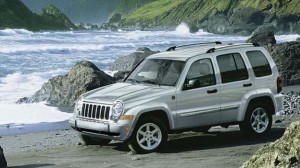
Chrysler is signalling it will decline a NHTSA request to recall 2.7 million Jeep Libertys and Grand Cherokees.
Barring a last-minute retreat, Chrysler is expected to formally advise the National Highway Traffic Safety Administration that it won’t recall 2.7 million older Jeep models federal safety regulators claim are at risk of catching fire in rear-end collisions.
That would set off one of the biggest showdowns ever between the government and an automaker, though even if the case goes to a jury the real test might come through the court of public opinion. While Jeep parent Chrysler has won some support from those who see NHTSA over-reaching its authority, the automaker is already facing pressure from consumer groups and Jeep owners worried about their safety.
NHTSA set the showdown in motion earlier this month when it declared that older Jeep Grand Cherokee and Jeep Liberty models with gas tanks mounted behind their rear axles are at risk of catching fire in rear-end collisions. The government claims 51 people have been killed in fiery crashes resulting from what it describes as a design defect.
For its part, Chrysler claims that the Jeeps met all federal safety standards when they were produced – the Grand Cherokees targeted by NHTSA were sold between 1993 and 2004, while the Jeep Liberty SUVs were sold from 2002 to 2007.
The maker last week issued a statement asserting that it “does not intend to recall the vehicles.” It has until midnight tonight to issue a formal response to the government.
One possible approach would be to cite the 10-year statute of limitations on recalls, noted Clarence Ditlow, director of the Center for Auto Safety, the consumer group that originally spurred NHTSA to investigate the Jeep gas tank issue three years ago. Such a move would effectively limit the potential action the government could take to only a small number of the vehicles it originally asked Chrysler to recall.
Placing gas tanks behind the rear axle was common industry practice for a number of years, as was mounting tanks outside the frame on trucks. The issue has literally exploded into the public eye on several occasions, perhaps most notably in terms of the Ford Pinto, which became infamous for fiery rear-end crashes. The situation was worsened when internal corporate documents revealed Ford had rejected the idea of adding metal shields to reduce the risk of a fire due to cost.
No one expects Chrysler to relocate the gas tanks on the older Liberty and Grand Cherokee models but even so, alternative fixes could still be expensive. Among the possible options cited by skeptics: adding a fuel tank check valve or modifying the fuel hose to reduce risks of a leak following a crash. One of the more costly approaches would be bolting a metal shield around the gas tank, which consumer advocate Ditlow estimates could cost $100 a vehicle – or $270 million were all 2.7 million Jeeps recalled.
Should the maker reject the NHTSA request, the agency could order a series of public hearings. That’s a potentially embarrassing process that Ford decided to avoid when it reversed itself after initially refusing a 2011 government request to recall 1.2 million pickup trucks for defective airbags.
Ultimately, the case could wind up in court. General Motors fought and won a battle with NHTSA over a recall order involving millions of compact X-Car models produced during the 1980s. The government alleged they suffered from defective brakes that could cause the vehicles to swerve out of control during aggressive stops.
But industry analysts caution that while GM might have won the battle it lost the war, the public scrutiny leading many potential customers thinking twice about purchasing vehicles from a company that appeared to be putting profits ahead of the public safety.
That is something Chrysler clearly risks.
On Monday, Janelle Embrey visited a Jeep dealership demanding it correct the alleged problems with her mother’s 2004 Grand Cherokee. Embrey has become a symbol of the debate after having been involved in an October 2012 crash in which a mother and teenage boy burned to death in a 1998 Jeep Grand Cherokee.
“I’m shocked,” she said of Chrysler’s likely refusal to order a recall. “How many more people will die?”
The automaker does have its defenders, however, including Bob Lutz, the retired General Motors vice chairman who had earlier served as Chrysler president. During his career, Lutz said, he often saw the government demand recalls for issues that he claims were not justified by the data.
“I sure like (Chrysler CEO Sergio Marchionne) for not knuckling under to the feds,” Lutz said during a Detroit radio interview. The executive headed product development at Chrysler when the Jeep Grand Cherokee was engineered. Insisting that NHTSA’s data does not support its position, Lutz declared the SUV “as safe as anybody else’s.”
There has been a notable increase in NHTSA’s enforcement of safety issues over the last few years and some skeptics suggest it is the result of criticism the agency took for delaying action on problems Toyota had with so-called unintended acceleration – ultimately leading the maker to recall over 10 million vehicles.
In the end, many observers believe Chrysler and the government will find a compromise over the Jeep issue. “I think cooler heads will eventually prevail,” David Kelly, former acting NHTSA administrator under President George W. Bush, told the Associated Press.
But for now, he added, the two sides will likely take a tough stand before moving to find a solution.

This should be an interesting catch-22 as Chrysler has a valid point that the vehicles met all safety requirements at the time of production including NHTSA’s.